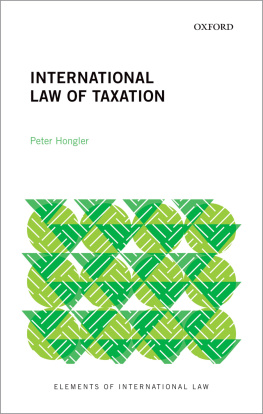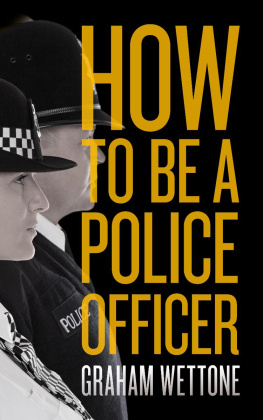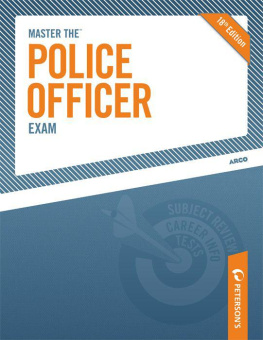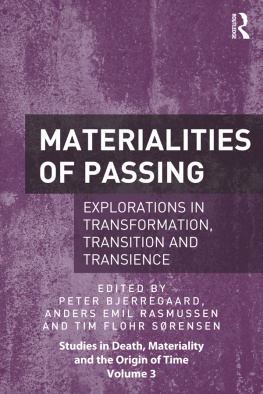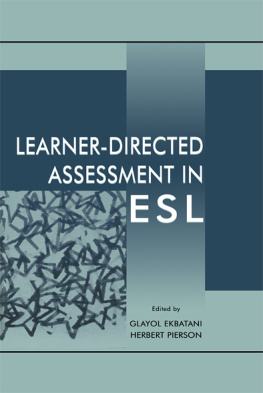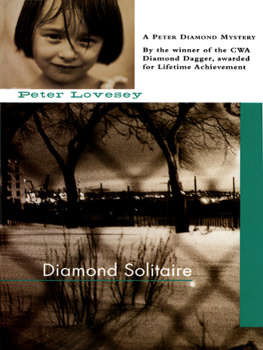Passing the Police
Recruit Assessment
Process
Second edition
Passing the
Police Recruit
Assessment
Process
Second edition
PETER COX
First published in 2007 by Law Matters Ltd.
Reprinted in 2007.
Reprinted in 2008 (twice).
Reprinted in 2009.
Second edition published in 2010 by Learning Matters Ltd.
All rights reserved. No part of this publication may be reproduced, stored in a retrieval system, or transmitted in any form or by any means, electronic, mechanical, photocopying, recording, or otherwise, without prior permission in writing from Law Matters.
2010 Peter Cox
British Library Cataloguing in Publication Data
A CIP record for this book is available from the British Library.
ISBN: 978 1 84445 358 0
This book is also available in the following ebook formats:
Adobe ebook ISBN: 978 1 84445 669 7
EPUB ebook ISBN: 978 1 84445 668 0
Kindle ISBN: 978 1 84445 975 9
The right of Peter Cox to be identified as the Author of this Work has been asserted by him in accordance with the Copyright, Designs and Patents Act 1988.
Cover design by Code 5 Design Associates Ltd
Project management by Deer Park Productions, Tavistock
Typeset by Pantek Arts Ltd, Maidstone, Kent
Printed and bound in Great Britain by Bell & Bain Ltd, Glasgow
Learning Matters Ltd
33 Southernhay East
Exeter EX1 1NX
Tel: 01392 215560
info@learningmatters.co.uk
www.learningmatters.co.uk
Contents
Acknowledgements
Peter Cox would like to thank his wife Janice for all the support, help and encouragement she gave him during his police career and while writing this book.
Every effort has been made to trace the copyright holders and to obtain their permission for the use of copyright material. The publisher and author will gladly receive information enabling them to rectify any error or omission in subsequent editions.
The author and publisher would like to thank the following for permission to reproduce copyright material:
The Integrated Competency Behavioural Framework Version 9.0 (May 2007) reproduced, in part, in of this book with the kind permission of Skills for Justice.
Chapter 1
Introduction
Why this book?
The National Police Recruit Assessment Process operates at the highest standards possible, but the advice and guidance available to people who are considering undergoing this assessment process are limited and vary in quality. This book, therefore, includes not only an explanation of the National Police Recruit Assessment Process but also exercises that have been designed to help you acquire or enhance the skills and abilities you need to become a police officer.
You should work through the contents of this book in the order they are presented. This will assist you in understanding:
- whether a career in the police service is for you;
- the reasons why a National Police Recruit Assessment Process has been established;
- the National Core Competencies;
- how to complete the written application;
- what is included in the assessment;
- the requirements for each section of the assessment;
- the skills and abilities required to be a police officer (these are tested during the assessment process); and
- the feedback you receive following an assessment.
You should create a self-study plan when using this book. How you devise this and the detail it contains will be dictated by the time you have available prior to attending for your assessment.
When you are preparing for the assessment process, you must obtain certain information and guidance. This will help you when you come to consider and develop your skills and abilities. It is important that you obtain information and guidance from more than one person: detailed feedback from a number of different sources will enable you to assess yourself accurately and will help you to develop the appropriate skills. Try, therefore, to get help from at least three different people, preferably from different walks of life (for example, from your family, work and social environments). You should also read and make sure you understand the information you receive from the Police Service to which you have applied. This should be received at least two weeks before you attend for assessment.
A number of issues are mentioned on more than one occasion in this book. This will help you to understand the requirements for that particular part of the assessment process and will also reinforce the key learning points.
Is a career in the police service for you?
A career in the police has been portrayed in endless television programmes, usually in a positive way showing the more enjoyable and rewarding aspects of being a police officer. Within the longer-running police series people can often move from routine uniform duties to specialised units as well as getting promoted. Before making an application to be a police officer it is often worth considering the parts of the service that are not usually demonstrated within the shows.
Police officers obviously work across 24 hours a day seven days a week. People joining as a constable always know this but the practical realities often only strike after they become operational. Over the years each police service has attempted to align their resources to meet the demands for help and assistance from the public. These demands are usually far fewer between 9 a.m. and 5 p.m., Monday to Friday when most people are at work, in education or are out and about shopping. For most police areas this means having the minimum numbers of staff on duty during these periods. This allows the maximum number of officers to be available during other times. In real terms this means a great deal of evening and weekend work. Any potential officer needs to consider whether working hours to fit public requirements will fit in with their own and their familys lifestyle. It is not for everyone.
While the hours can be demanding it must also be remembered that bank holidays and days off around them can often be very limited. Just consider a New Years Eve. The biggest numbers of officers possible will be required during the evening and early hours of New Years Day. Major sporting events and demonstrations also require much policing. Even when events are not within this country they can have a dramatic effect on policing requirements. When the England football team competes in World Cup finals, on the days they play there are often increased demands on police to attend public order disturbances after the games have finished, particularly if England has been eliminated. It is not unusual to have rest days cancelled for such events, often affecting personal plans that individual officers have made.
Television programmes never show the amount of writing that has to be completed by officers across a wide range of duties and activities. If this were shown, no doubt viewing figures would plummet. It is often said that a police officer is only as good as their ability to write about what they saw and heard, what they did and why they did it. Making the best arrest in the world is not a lot of use if the subsequent court file is not presented appropriately or does not have sufficient evidence to secure a conviction. Any police officer will tell you that writing is a major part of their job.







